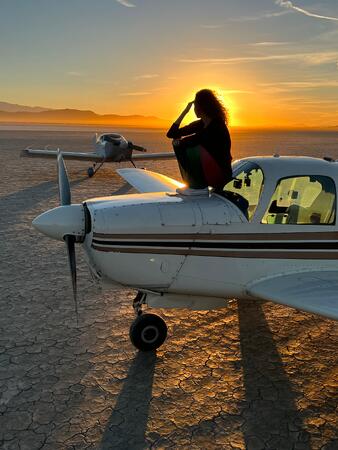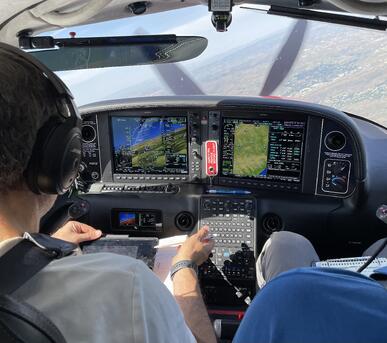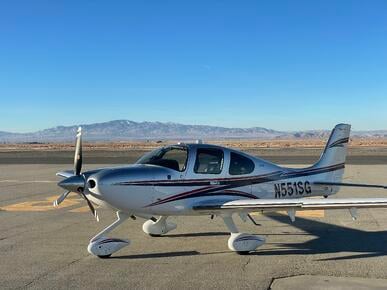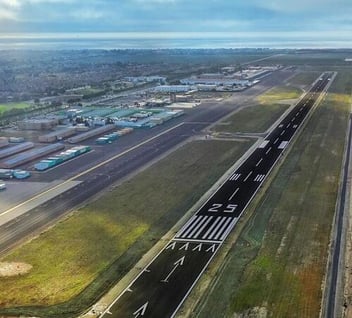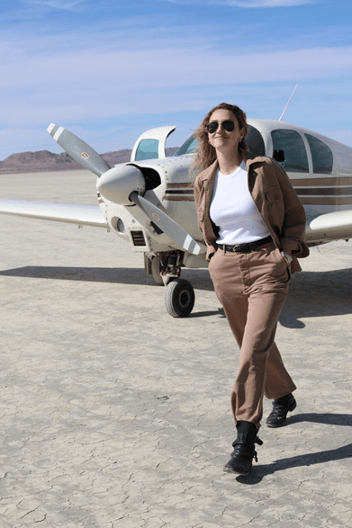What pilots are made of
Do you believe our destiny is written in the stars? I don’t mean it astrologically, but rather in the sense that we long for that which often appears unreachable, and all because we have the overwhelming feeling that it is our telos to follow a certain path or direction on account that it was predestined. The intersection where that longing and purpose meet, is where my love for aviation resides. For, you see, flying is not natural to man, but I think I speak for every pilot when I tell you that for some of us the sky holds an irresistible fascination, as if all along we were born to fly. It is only when we leave the tarmac and become airborne that everything seems to align perfectly, giving those of us who take flight an experience that transcends the limits of our gravity-bound existence. That voluntary change of elements–from earth to air–has been sparking onlookers with untethered curiosity since the inception of aviation.
Invariably, when asked what I do for a living, the answer, “I’m a pilot”, brings with it a myriad of follow-up questions. I think few other professions elicit that much genuine interest. And by this I mean, when was the last time you asked, say, your dentist, to tell you about the thrill of drilling a tooth? (I’m not trying to disparage dentistry. My dentist, Dr. Kleiger, is a fan of aviation, our patient-doctor relationship is filled with mutual respect and admiration. I know he will have a laugh when he reads this.)
People often ask me what it takes to become a pilot, what sort of personality or physical traits are required. For instance, “do you have to be good at math, have perfect eyesight, be comfortable with heights?” And my answer is no, none of the above. The calculations you have to do as a pilot are easily within grasp of the average high school student. But it helps to have an engineering mind. After all, you will have to understand and hopefully create a synergy with the machine you are operating. You have to pass medical examinations as well, more rigorous as your license add-ons progress (just to ensure you are in good health), but regarding eyesight, as long as your deficiencies can be corrected with glasses or contact lenses, you should be fine. A little irony– as for acrophobia (fear of heights), as paradoxical as it might seem, it is not uncommon for pilots to be uncomfortable with heights, simply because it is a common phobia, and just like you, we are not impervious to it. However, rest assured that the queasiness you might feel when you stand on top of a very tall building, or at the edge of a cliff, does not manifest itself when you are flying a plane. The experience is simply different. “So then, can more or less anyone become a pilot, and get paid to watch the gorgeous scenery from above, day in and day out?”, you might ask. No, not quite. Certainly, the scenic views are one of the perks of the trade, but don’t let yourself be fooled, we do much more than just looking out of the window. Being a pilot is a demanding job, one that pushes the limits of our potential and constantly tests our levels of competence.
So, exactly what are the descriptors of a good candidate? Maybe you saw Top Gun: Maverick, and the sense of camaraderie and spirit amongst aviators piqued your interest. That feeling of “nothing to lose and everything to gain”, put you in the mindset of starting a new adventure. For me it was reading West With the Night. I ended up in Africa at 18 years old during a long University hiatus (simply put, I played hooky for a year), hopping from country to country, waking up in tents to the sound of lions and the unexpected elephant visiting our camp (much scarier than what I’m making it sound). That’s what eventually led me to a career in aviation, I wanted to be Beryl Markham. But the ways you get here don’t matter, what counts is the momentum built entirely by one’s love for flying, something that can not be set aside or effaced, but, in fact, keeps thriving and getting bigger, like a separate organism. That impetus is the main prerequisite for becoming a pilot, the rest are attributes that if you don’t yet have you can work on developing along the way, such as the ability to: multitask, be decisive, focus, be serious about attaining absolute competence, (be it as a hobby or as a profession, aviation is not a field where you can cheat or “make do”), carry the responsibility for your life and that of others, not be over-reactive but remain collected in face of critical situations.
To sum up, a good pilot doesn’t push through at all costs, but is mindful of their strengths and weaknesses, and manages them intelligently. Can everyone become a pilot? Strictly speaking, probably not, but if you are intrigued by aviation, have a yearning to fly and are willing to be diligent, the likelihood of you getting there is high.
Do you feel that some of your doubts were left unanswered or perhaps you have no questions but happen to long for a sense of community? Maybe you are even already a pilot and have interesting stories to share? Stick around, and sign-up for our Open Hangar Night. It takes place once a month (check out our calendar and subscribe to the Clipper News Letter), it’s free, and you get to hang out with the whole team at Clipper Aviation. We welcome you with refreshments, entertaining trivia games with fun prizes, (Top Gun themed karaoke might happen), a guided tour of our fleet + simulators and the willingness to answer questions until you feel satisfied. In the words of Timothy Leary, “Who knows what you might learn from taking a chance on conversation with a stranger? (…) Do the unexpected find the others.”
